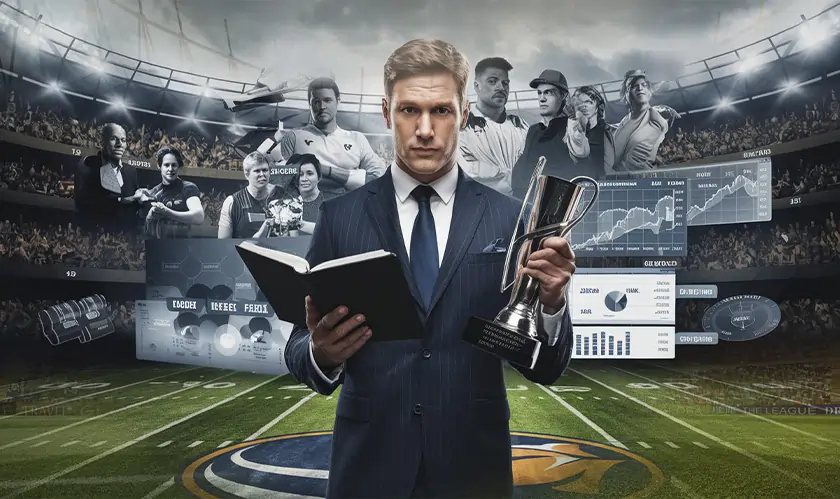Home Industry Sports How Crucial is it to Have a CE...
Sports

CIO Bulletin
06 November, 2024
In the competitive world of sports teams, the team's ultimate authority plays a crucial role in managing a franchise. This role involves overseeing business, marketing, and sports activities, requiring a blend of strategic leadership, finance, and operations skills. Conflict between interests and merits can lead to control over aspects like sponsorship deals, athlete development, and media outreach. The decisions made by authority figures can impact team performance, revenue, and market growth.
Again, the sports industry comprises functions, events, and activities that span across and within regions and continents, thereby seeking new openings, and creating new challenges such as digital evolution and sponsorship issues. The ability to see the big picture and connect that to overseeing operations, business strategy, and market execution is where a CEO is pivotal. Interestingly, without the right systems of governance, even skilled players and coaches can find it hard to deliver their talents and performance, which brings out the need of systems that support the strategy in place.
The top executive in sports is more than someone who just travels with the team and gives speeches. They are responsible for managing the organization's image, handling conflicts, and balancing relationships with fans, investors, players, and employees. Inner strength is crucial for successfully managing a sports team franchise. Both on-field and off-field activities contribute to this strength, making the CEO's role in sports highly significant.
1. Strategic Leadership role of the CEO
CEOs of franchise sports teams are in charge provide vision and direction as the head of a multimillion dollar complex, franchise sports team. The CEO ensures long-term goals align with day-to-day activities to drive development in sponsorship, media, fan, and merchandise sales. Athletes and championships are important, but the business side is equally crucial.
The example illustrates how the CEO occupies a critical role in places where major high order decision making about such issues as seeking new markets, investing in the business, and ways of making money for the franchise are made. Such a vision helps in ensuring that the organization is competitive in both sports performance and even financial performance, which most times is the cut-off between a winning team and a losing team.
A sports franchise is a business that requires financial discipline for stability and growth. The CEO manages funds through budgeting, sourcing sponsors, and signing profitable broadcast deals. Collaboration with the CFO and senior officers is vital to diversifying revenue streams and avoiding reliance on a single source like ticket sales or sponsorships.
Secondly, however, they will have to determine how much to pay players, how much to spend on the building of stadiums, and how long to sign players for that will all have specific effects on the bottom line. And when the team is underperforming or the franchise is losing money, the CEO plans how to make changes to improve the business without losing the team’s competitiveness.
3. Relationship Building and Stakeholder Management
The CEO oversees team management and strategy, while also building relationships with stakeholders in the sports ecosystem such as team owners and fans. Acting as the key interface between the franchise and its owner or investors, they manage information flow and reconcile agendas. They also handle partners, sponsors, and community outreach.
This is important for the development since the support is a constant for a given period and also helps to keep the team a cherished one not only in its region but they also in the world as well. The positioning and the reputation of the team is also the responsibility of the CEO especially in the instances of conflict mitigation for instance, legal battles, incidents involving players or adverse media coverage.
4. Recruiting Versus Culture
Evidently, the role of a CEO permeates deeply to the organizational culture of the team. They are enhancing even junior staff’s talents that boardroom executive and coach roles must fill. An effective Chief Executive Officer will, therefore, be quick to place a head coach of their choice to assist in every aspect of the organization such as sportsmen policies, recruitment, and trades.
Individual performance is not the only thing that counts for the team’s success—it’s about a culture where people take responsibility, they push each other and collaborate. Promoting diversity and inclusion is the work of the CEO, who has to provide all team members with the conditions for successful work. The team's outcomes on the field very much depend on the values and culture of the franchise in other words, of the CEO.
5. Crisis Handling and Business Continuity Planning
A crisis in sports can arise from various issues such as player injuries, poor performance, or off-field controversies. In these situations, a competent CEO is crucial to handle and navigate through the challenges. They are responsible for managing scandals, addressing negative press, boosting team morale, and adapting the organization during unfavorable circumstances. The CEO is essential in leading during emergencies.
In such trying situations, their influence and judgment can see the team successfully weather the storms and even grow. By looking at the problem in the long run, the chief executive officer provides oversight for the carrying out of the activities of the franchise as well as safeguarding its image.
Conclusion
A CEO's presence in a franchise sports organization is crucial. They provide strategic direction, manage finances, handle external interactions, and foster a winning environment. Their ability to blend sports and business, manage stakeholders, and lead through challenges significantly impacts the franchise's success.
Furthermore, the evolution of the sports industry has seen the importance of the position of the CEO increase in the quest for sustained achievement on field and off field. A great CEO does not only direct a group of individuals – he or she constructs an empire of influence that guarantees the healthy and financially successful operation of the franchise, loved by the fans across the globe.
FAQs
1. What is the most significant responsibility of a CEO in a sports franchise?
The CEO is responsible for strategic planning, operationalization of strategies, and most importantly achieving and maintaining growth both in the financial and competitive perspective.
2. How does the CEO ensure that the franchise remains stable financially?
The CEO is responsible for planning and controlling the expenditure, advertising revenue, winning sponsors, getting and marketing deals as well as managing other related activities.
3. To what extent is the role of the CEO in managing the stakeholders?
The CEO develops the support from and loyalty towards the organization’s brands and services by developing these three groups – investors, sponsors, and fans.
4. What role does the CEO play in fostering team dynamics?
The CEO gives direction, ensures there is no blame culture, and encourages a culture of winning for the progress of the organization.
5. How does the CEO deal with crises in the franchise?
The CEO deals with the crises by employing strategic management of resources to sail through the storm while ensuring there’s brand preservation in the forefront and accumulation of richness is not the only goal in mind.

Insurance and capital markets







